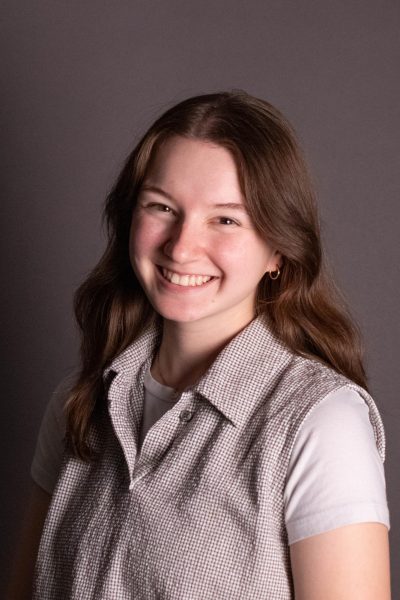Anything goes in Shakespeare’s comedy, “A Midsummer Night’s Dream”
Oliver Harry (left) and Gavin Anderson McElligott (right) in William Shakespeare’s “A Midsummer Night’s Dream” put on by the Winona State University Theater and Dance Department.
April 18, 2023
In one of the final sets of performances of the 2022-2023 year, Winona State University performed four nights of Shakespeare’s “A Midsummer Night’s Dream” in the Vivian Fusillo main stage theater. With the contrast of Early Modern English and the more 1960s-style costumes and bits, Winona State’s Theatre and Dance department put on a hilarious and unique show.
William Shakespeare’s “A Midsummer Night’s Dream” follows four Athenians (Oliver Harry, Louisa Schirmacher, Sanorah Goldoff and Gavin Anderson McElligott) as they make their way into the woods and get tricked by Puck the fairy (Darien Odette). Puck makes two of the boys fall in love with the same girl, a trick is played on the fairy queen, Titiana (Hannah Beumer), the magic is reversed and finally, a play is performed.
“A Midsummer Night’s Dream” is very similar to other Shakespeare plays in the sense that there are several storylines going on at once that all come together in the end. Winona State’s theatre department did a great job in making sure each plotline had their own tone while maintaining the overall atmosphere of the play as a whole. Whimsicality, spontaneity and deception were present throughout the entirety of the production, which added to the overall engagement and humor in the end.
Darien Odette, accounting major and “Puck” in the production, spoke on the difficulty of Shakespeare and the sense that more than one storyline can make the practice and production of the show very complex. With only four weeks of rehearsals when it is usually five to six, the cast definitely felt this pressure.
“With many different moving parts and plotlines that intersect only briefly, it can be difficult to connect everything and make it one cohesive production,” Odette said. “It can be hard to perfect the flow of Midsummer, but I think my castmates and I did wonderfully in that regard.”
The four(ish) separate plotlines included the mechanicals, the Athenian Court, the lovers and the fairy court. All cast members came together in the end to celebrate the successful love stories of the four lovers, and the set itself also reflected the changes in scenes and characters.
Another element of the show that made it especially stand out and engaging for the audience was the elevated humor. When the mechanicals came out on the stage to perform their play within a play, the audience quite literally roared with laughter. The actors’ willingness to give it their all in their characters showed through the animated and hilarious characterization and energy.
Alex Mostek, a psychology major and Francis Flute in the show, commented on the levels of humor that were built throughout the rehearsal process, which points to the originality of the show and how in some ways, it was built from the ground up.
“The development of the comedy in the show was very much ‘anything goes’. If the directors thought an idea, choice or even a mistake was good, it was put in the show,” Mostek stated. “The directors also decided to set the show in the 1960s, which I think gave us more room to experiment and adapt.”
Odette echoed this sentiment by explaining how willing the cast was to work together on adding specific and unique bits to the process.
“We are always bouncing ideas off each other and giving each other energy; whenever I added a new bit in, my scene partners were ready and willing to take me up on that idea and add onto it themselves, and vice versa,” Odette said. “We’re all committed and have a deep love for the craft.”
The cast was said to be a very close knit and fun group of people to work with, which you could definitely see from the audience’s perspective. The conversations on stage were lively, fun and seemed genuine, which you do not see all the time, especially with a performance of Shakespeare.
Hannah Beumer, a psychology major and Titania the fairy queen in the production, also had this positive opinion on the cast as a whole and the connections that were made throughout the rehearsal process.
“Every single day we have come into rehearsal and performances with the intent of giving it our all; even on days when we’ve been incredibly tired, once we stepped out onto the stage everything else fell away,” Beumer said. “We’ve depended on each other throughout this entire process, and because of that I think we were left with a pretty amazing product.”
The show ended with Odette’s character, Puck, speaking with the audience in a classic Shakespearian closing monologue. This is where two hours of audience participation, laugh-out-loud moments, deceptive behavior that resulted in many gasps and an overall dramatic and fun performance came to an end with the main source of deception apologizing for their role in the trickery.
“It’s a very special feeling that warms my heart, to be able to perform that final monologue while having a sort of conversation with those in the house,” Odette said. “It may be a strange and borderline sinister apology on Puck’s part, but it’s a sincere ‘thank you’ from me.”




































Katana Provost • Apr 26, 2023 at 8:39 pm
good article, would read again rate: bms